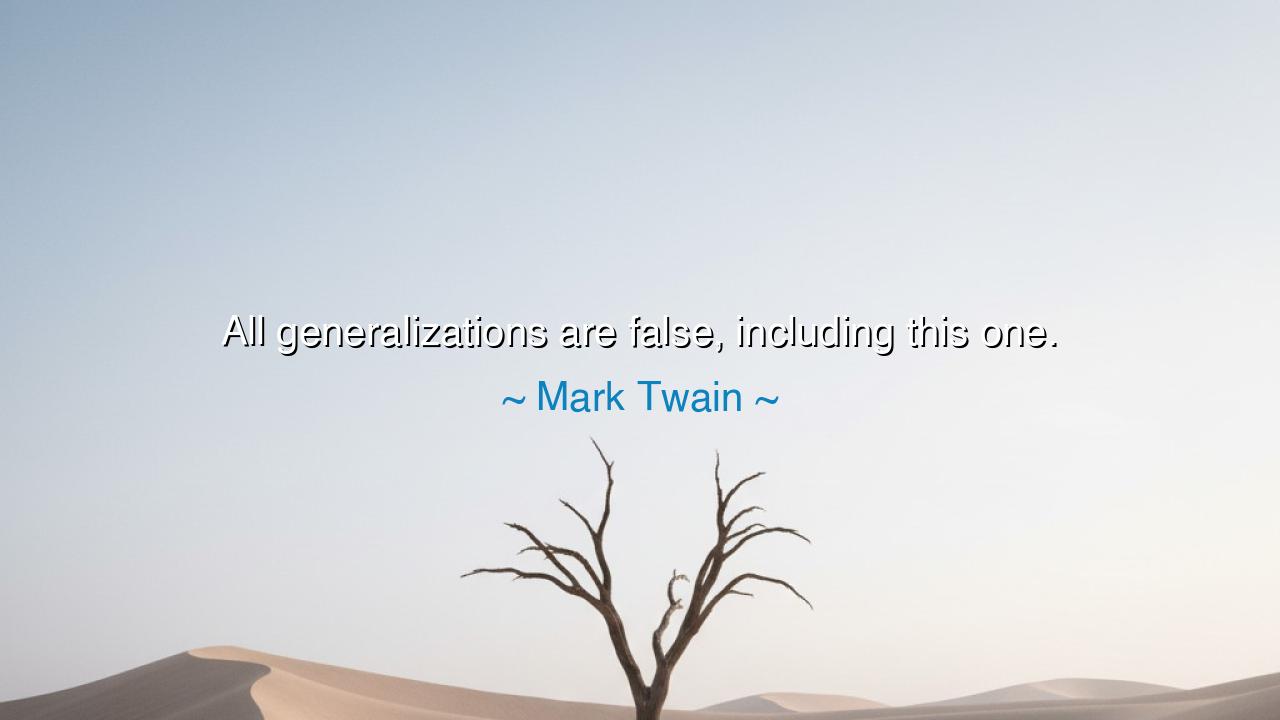
All generalizations are false, including this one.






In the twilight of the 19th century, when reason and irony walked hand in hand, the great American sage Mark Twain uttered a paradox so perfect that it still gleams like polished steel: “All generalizations are false, including this one.” To those who hear it lightly, it is a jest — a clever twist of words, a joke fit for after-dinner laughter. But to those who listen with the ear of wisdom, it is a mirror held up to the human mind, revealing both its brilliance and its blindness. Twain, with the soul of a philosopher hidden beneath the smile of a humorist, reminds us here that truth cannot be chained by simplicity — that life, in all its vastness, resists being captured by a single saying.
The origin of this quote lies in Twain’s endless war against hypocrisy and pretense. He was a man who distrusted easy truths, who saw that the world hungers for certainty even when certainty deceives. In his day, as in ours, people sought comfort in generalizations — statements that reduce the infinite variety of human experience into neat, digestible rules. But Twain knew the danger of such simplicity. For every “always,” there is a “sometimes.” For every “never,” an exception waiting in the shadows. Thus, his jest becomes a paradox — a truth that destroys itself in the very act of being spoken. By saying that all generalizations are false, and then including his own statement among them, Twain exposes the futility of absolute claims and invites us into the dance of reason and humility.
In the ancient world, such a thought would not have been out of place among the philosophers of Athens. Socrates, too, loved the weapon of contradiction. When his students made broad claims — “All men desire good,” or “Virtue can be taught” — he would smile and question them until their certainty crumbled into confusion, from which real wisdom could grow. Twain’s humor is the heir of that ancient irony. He teaches through laughter what Socrates taught through questions: that to know truth, one must first learn to doubt one’s own understanding. The wise do not cling to absolutes, for they know that life is too vast, too changeful, too alive to be reduced to a single rule.
History offers proof of this lesson. Consider the age of scientific discovery, when the learned men of Europe declared that all swans were white. It was a generalization supported by centuries of observation — until explorers in Australia found black swans gliding on quiet waters. In that instant, an empire of certainty collapsed, and the world became larger again. Twain’s words echo that moment. Every “truth” we hold too tightly blinds us to the greater truth beyond it. The generalization comforts us with order, but the exception humbles us with mystery.
Yet Twain’s paradox is not an attack on reason; it is a celebration of thought. His irony invites us to laugh at our own foolishness, not to despair of it. He does not say that knowledge is impossible — only that it is incomplete. The moment we believe we have captured truth forever






AAdministratorAdministrator
Welcome, honored guests. Please leave a comment, we will respond soon